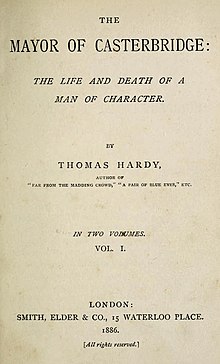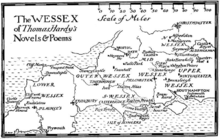How May Years Until Henchard Sees Susan Again
 First edition title page | |
| Author | Thomas Hardy |
|---|---|
| Illustrator | Robert Barnes |
| Country | U.k. |
| Language | English |
| Genre | Novel |
| Published | London[ane] |
| Publisher | Smith Elder & Co[one] |
| Publication date | 1886[1] |
| Text | The Mayor of Casterbridge at Wikisource |
| First published in ii volumes[1] | |
The Mayor of Casterbridge: The Life and Decease of a Man of Grapheme is an 1886 novel past the English language writer Thomas Hardy. One of Hardy'south Wessex novels, it is set in a fictional rural England with Casterbridge continuing in for Dorchester in Dorset where the author spent his youth. Information technology was first published as a weekly serialisation from January 1886.
The novel is considered to exist 1 of Hardy's masterpieces, although information technology has been criticised for incorporating too many incidents: a issue of the author trying to include something in every weekly published instalment.
Plot [edit]

Henchard on the way to the fair with Susan and Elizabeth-Jane
At a country fair almost Casterbridge in Wessex Michael Henchard, a 21-year-old hay-trusser, argues with his wife Susan. Drunk on rum-laced furmity he auctions her off, along with their baby girl Elizabeth-Jane, to Richard Newson, a passing sailor, for five guineas. Sober and remorseful the side by side day, he is too tardily to locate his family. He vows not to touch liquor again for 21 years.
Believing the auction to be legally binding, Susan lives equally Newson's wife for 18 years. Subsequently Newson is lost at sea Susan, lacking whatever ways of support, decides to seek out Henchard again, taking her daughter with her. Susan has told Elizabeth-Jane little about Henchard, and the immature woman knows just that he is a relation by matrimony. Susan discovers that Henchard has become a very successful hay and grain merchant and Mayor of Casterbridge, known for his staunch sobriety. He has avoided explaining how he lost his wife, allowing people to assume he is a widower.
When the couple are reunited, Henchard proposes remarrying Susan after a sham courtship, this in his view being the simplest and virtually discreet style to remedy matters and to foreclose Elizabeth-Jane learning of their disgrace. To do this, however, he is forced to break off an date with a woman named Lucetta Templeman, who had nursed him when he was ill.
Donald Farfrae, a young and energetic Scotsman passing through Casterbridge, helps Henchard by showing him how to salvage substandard grain he has bought. Henchard takes a liking to the man, persuades him not to emigrate, and hires him equally his corn factor, rudely turning abroad a man named Jopp to whom he had already offered the job. Farfrae is extremely successful in the part, and increasingly outshines his employer. When he catches the middle of Elizabeth-Jane, Henchard dismisses him and Farfrae sets himself up as an independent merchant. Farfrae conducts himself with scrupulous honesty, simply Henchard is so determined to ruin his rival that he makes risky business concern decisions that testify disastrous.
Susan falls ill and dies soon afterward the couple'due south remarriage, leaving Henchard a alphabetic character to be opened on the day of Elizabeth-Jane's nuptials. Henchard reads the letter, which is not properly sealed, and learns that Elizabeth-Jane is not in fact his girl, merely Newson's – his Elizabeth-Jane having died as an infant. Henchard's new noesis causes him to conduct coldly towards the second Elizabeth-Jane.
Elizabeth-Jane accepts a position as companion to Lucetta, a newcomer, unaware that she had had a relationship with Henchard which resulted in her social ruin. Now wealthy after receiving an inheritance from her aunt, and learning that Henchard's wife had died, Lucetta has come to Casterbridge to marry him. Nevertheless, on meeting Farfrae, she becomes attracted to him, and he to her.
Henchard's financial difficulties persuade him that he should ally Lucetta apace. But she is in honey with Farfrae, and the couple run away one weekend to get married, not telling Henchard until afterwards the fact. Henchard's credit collapses and he goes bankrupt. Farfrae buys Henchard's former business organization and tries to help Henchard by employing him as a journeyman.
Lucetta asks Henchard to return her old love letters, and Henchard asks Jopp to take them to her. Jopp, who still bears a grudge for having been cheated out of the position of factor, opens the messages and reads them out loud at an inn. Some of the townspeople publicly shame Henchard and Lucetta, creating effigies of them in a skimmington ride. Lucetta is and so devastated by the spectacle that she collapses, has a miscarriage, and dies.
The next day, Newson – who it transpires was not lost at body of water – arrives at Henchard'southward door asking near his girl. Henchard, who has come up to value her kindness to him, is afraid of losing her companionship and tells Newson she is dead. Newson leaves in sorrow. Later 21 years, Henchard's vow of abstinence expires, and he starts drinking over again.
Eventually discovering that he has been lied to, Newson returns, and Henchard disappears rather than endure a confrontation. On the day of Elizabeth-Jane'due south nuptials to Farfrae, Henchard comes back, timidly seeking a reconciliation. She rebuffs him, and he departs for good. Later, regretting her coldness, she and Farfrae set out to find him. They arrive too tardily, and learn that he has died lone. They also notice his last written statement: his dying wish is to be forgotten.
Master characters [edit]
- Michael Henchard: hay trusser who becomes Mayor of Casterbridge
- Susan Henchard (Newson): married woman of Henchard, sold to Newson
- Richard Newson: sailor; purchases Susan and lives with her for many years as her de facto husband
- Elizabeth-Jane: girl of Susan past Henchard; dies as an infant
- Elizabeth-Jane: daughter of Susan by Newson; marries Farfrae
- Donald Farfrae: becomes Mayor of Casterbridge after Henchard; Scotsman
- Lucetta Templeman (Le Sueur): native of Jersey who has an thing with Henchard; marries Farfrae
- Joshua Jopp: sometime manager with a grudge against Henchard.
Setting and date [edit]

Locations in Wessex, from The Wessex of Thomas Hardy by Bertram Windle, 1902, based on correspondence with Hardy.
The book is one of Hardy'south Wessex novels, and is set largely in the fictional boondocks of Casterbridge, based on Dorchester in Dorset.[2] The writer intended Casterbridge to be an imaginative presentation of certain aspects of the boondocks every bit he remembered information technology in the "dream" of his childhood.[3]
Although the opening sentence of the novel states that the events described took identify "before the nineteenth century had reached one-3rd of its bridge" the date of Hardy's own childhood places it rather later – in the mid-to-late 1840s.[4] [3]
First publication and early reception [edit]
Hardy started piece of work on The Mayor of Casterbridge in the spring of 1884, after a three-yr pause.[ii] He completed it in a piddling over a year, and it was first issued in weekly parts in January 1886, followed by full publication in May 1886.[5] A reader for the publisher, Smith, Elder & Co. was non impressed and complained that the lack of gentry among the characters made information technology uninteresting. It was issued with a minor print run of only 750 copies.[six]
Hardy himself felt that in his efforts to get an incident into almost every weekly instalment he had added events to the narrative somewhat likewise freely, resulting in over-elaboration.[seven] Notwithstanding, he was deeply affected, telling a friend that the novel was the just tragedy that made him weep while writing information technology.[8]
Later on appreciation [edit]
In her 2006 biography of Thomas Hardy, the author Claire Tomalin called the book a "masterpiece", a deeply imagined dramatic and poetic work, with a narrative on a chiliad scale and paced with extraordinary moments.[9] She praised it as beingness congenital on the territory in which Hardy worked best, in which the rural landscape is drawn with a naturalist'southward centre and in which country people play out their lives between custom and education, piece of work and ideas, and love of place and feel of alter.[ten] Hardy's portrait of Henchard – "depressive, black-tempered, self-destructive, and too lovable as a child is lovable" – she considered one of his strongest achievements.[eight] She did concur with Hardy, still, in noting that he tried to pack in too many incidents.[11]
Adaptations [edit]
Film and TV [edit]
- The Mayor of Casterbridge, a silent picture of 1921
- Mayor Nair, a 1966 Indian Malayalam film
- Daag, a 1973 Bollywood romantic drama film
- Vichitra Jeevitham, a 1978 remake of Daag
- The Mayor of Casterbridge, a 1978 seven-office serial for BBC TV
- The Claim, a 2000 film ready in the American Due west with events loosely based on the novel
- The Mayor of Casterbridge, a 2003 British TV film
Radio [edit]
- The Mayor of Casterbridge, a 1994 four-part dramatisation by Sally Hedges with David Calder equally Michael Henchard, Jason Flemyng as Donald Farfrae, Janet Dale as Susan, Andrea Wray as Elizabeth-Jane, Sandra Berkin as Lucetta, Mary Wimbush equally the Furmity-seller and John Nettles every bit Newson.[12]
- The Mayor of Casterbridge, a 2008 three-office radio play by Helen Edmundson for BBC Radio iv'south Classic Serial slot.[thirteen]
Opera [edit]
- The Mayor of Casterbridge, a 1951 opera by the young British composer Peter Tranchell, with a libretto by Tranchell and Peter Bentley. It received its start performance at that year'south Cambridge Festival.[14]
References [edit]
- ^ a b c d "British Library Item details". primocat.bl.uk . Retrieved 14 June 2018.
- ^ a b Tomalin 2006, p. 205.
- ^ a b Bullen, JB (2013). Thomas Hardy: The World of his Novels. Frances Lincoln Limited. p. 78. ISBN978-0-7112-3275-four.
- ^ Thomas Hardy, Dale Kramer (ten June 2004). The Mayor of Casterbridge. Oxford University Press, United kingdom. p. 13. ISBN978-0-19-160634-2.
{{cite volume}}: CS1 maint: uses authors parameter (link) - ^ Tomalin 2006, pp. 210, 420.
- ^ Tomalin 2006, p. 210.
- ^ Tomalin 2006, pp. 207, 420.
- ^ a b Tomalin 2006, p. 208.
- ^ Tomalin 2006, pp. 147, 206.
- ^ Tomalin 2006, p. 147.
- ^ Tomalin 2006, p. 207.
- ^ "Thomas Hardy - The Mayor of Casterbridge". BBC Radio 4 Extra . Retrieved 12 July 2019.
- ^ "Classic Series: The Mayor of Casterbridge". BBC Radio iv . Retrieved 4 November 2018.
- ^ A, J (September 1951). "Miscellaneous: 'The Mayor of Casterbridge'". The Musical Times. Musical Times Publications Ltd. 92 (1303): 421–424. JSTOR 934994.
Bibliography [edit]
- Tomalin, Claire (2006). Thomas Hardy: The Fourth dimension-Torn Man. London: Viking (Penguin Books). ISBN978-0-670-91512-5.
Farther reading [edit]
- Avery, Simon (2009). Thomas Hardy: The Mayor of Casterbridge · Jude the Obscure . Basingstoke and New York, NY: Palgrave Macmillan. ISBN978-0-230-00540-2.
- Lerner, Lawrence (1975). Thomas Hardy'southward Mayor of Casterbridge: Tragedy or Social History? . Eastbourne: Sussex University Press. ISBN978-0-856-21042-6.
- Taft, Michael (1981). "Hardy'south manipulation of folk lore and literary imagination: The case of the wife-sale in the Mayor of Casterbridge". Studies in the Novel. 13 (4): 399–407.
- Menefee, Samuel P (1981). Wives for Sale: An Ethnographic Written report of British Popular Divorce. Eastbourne. ISBN978-0-631-13301-viii.
External links [edit]
- The Mayor of Casterbridge at Standard Ebooks
- The Mayor of Casterbridge at Project Gutenberg
-
 The Mayor of Casterbridge public domain audiobook at LibriVox
The Mayor of Casterbridge public domain audiobook at LibriVox - Spark Notes study guide
- GradeSaver study guide
Source: https://en.wikipedia.org/wiki/The_Mayor_of_Casterbridge
0 Response to "How May Years Until Henchard Sees Susan Again"
Post a Comment